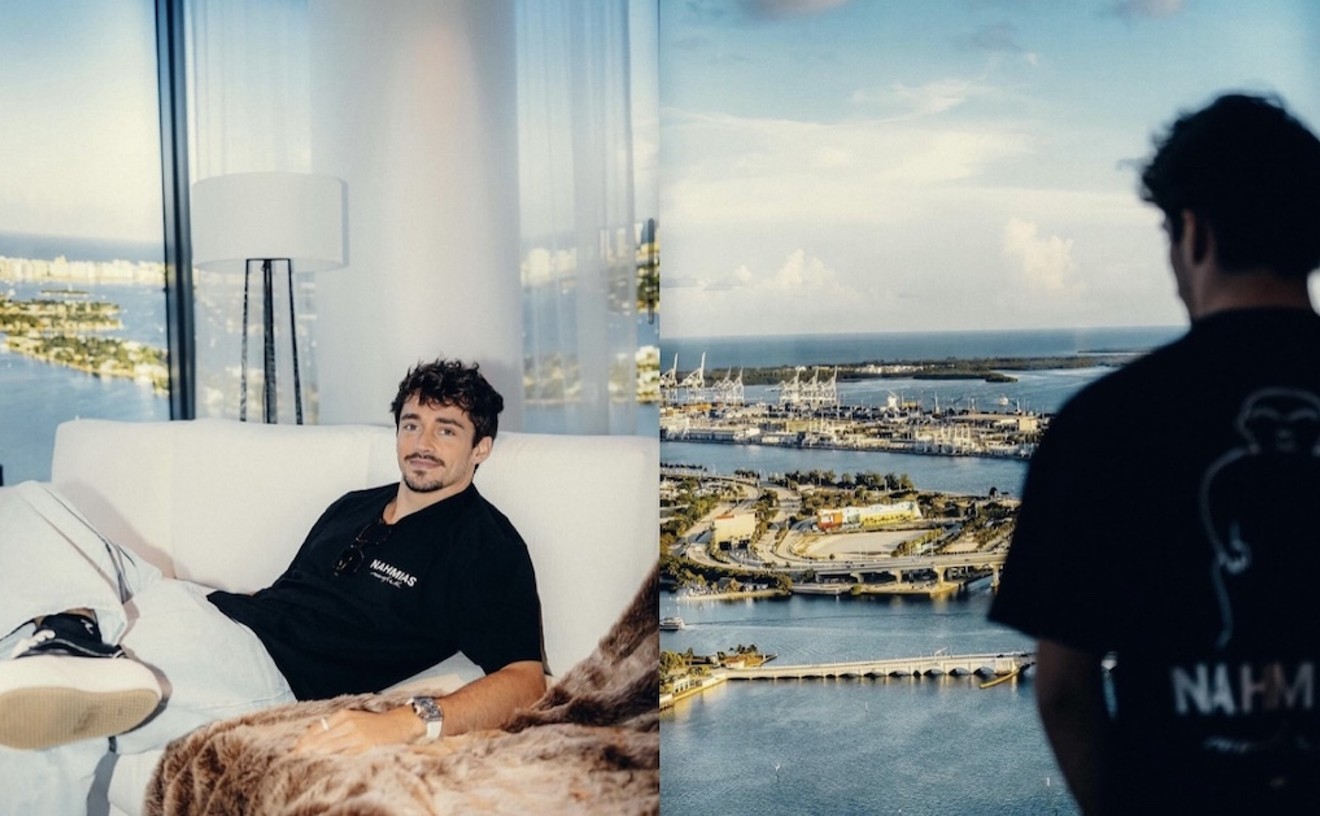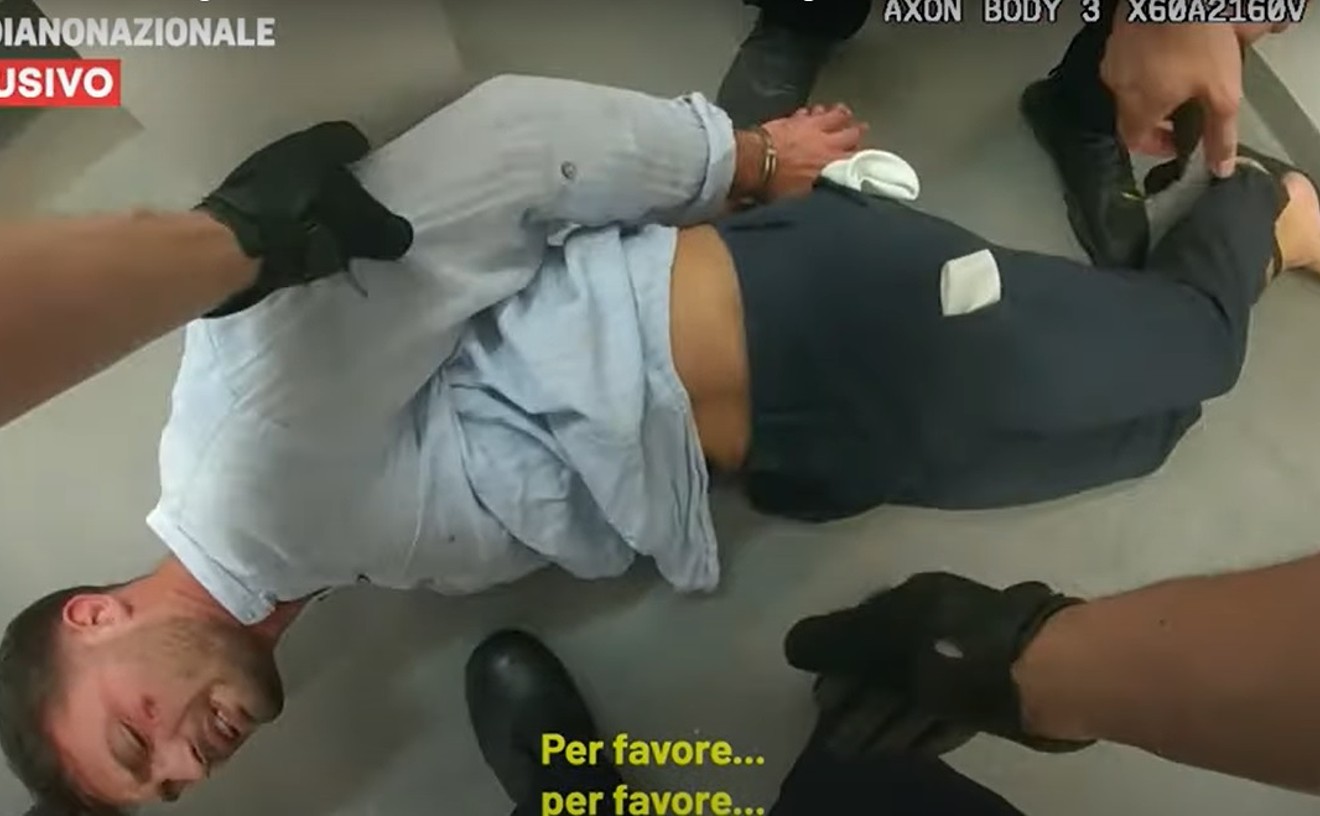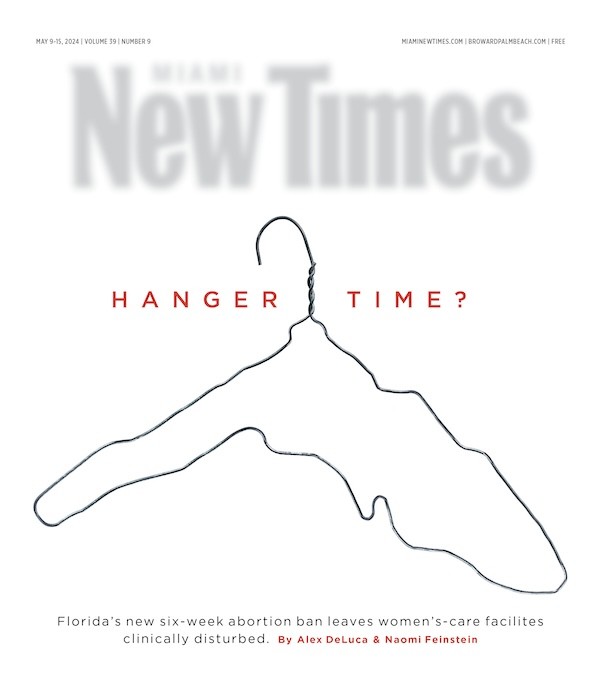Medrano was not a fan but a process server toting a summons. Prominent Miami criminal-defense attorney Milton Hirsch had filed suit in mid-April against the 33-year-old Martin (who was then playing for the San Diego Chargers) for breach of contract. Hirsch alleged the gridiron star agreed to pay a $175,000 fee for an accused drug dealer named Rickey Brownlee, then reneged. On May 12 Medrano mailed the papers to Martin's home and left a second set with a secretary at Chargers headquarters.
Hirsch's lawsuit is only the beginning of the football star's worries. Three law enforcement sources told New Times that the U.S. Attorney's Office and the Drug Enforcement Administration are investigating Martin to determine if he laundered drug profits for Brownlee. In January the feds accused Brownlee, Martin's childhood friend, of running one of South Florida's largest drug rings. The Opa-locka businessman -- who owns a well-known restaurant, a car wash, and several buildings in the area and who was the subject of an April 23 New Times cover story -- faces seven counts of cocaine and heroin trafficking. He is now awaiting trial in the downtown Federal Detention Center without bond.
The investigation of Martin comes at a time when he should be celebrating. Last year he inked a $9.4 million, four-year contract with San Diego. This spring the Chargers traded him to the Atlanta Falcons, bringing him closer to his family in South Florida. And he's been playing some of the best ball of his tumultuous ten-year career.
If the feds charge Martin with a crime, it could jeopardize his National Football League standing. Moreover, the NFL could punish him just for hanging around with Brownlee, who was convicted twice in the Eighties for cocaine trafficking. "Improper associations would be a cause of concern and could lead to action from the commissioner's office," says NFL spokesman Greg Aiello, speaking generally about NFL policy.
Martin didn't return three messages left at the Falcons' training camp. His father Harold Martin told New Times only: "I will not discuss a sensitive issue involving my son." Kieran Fallon, Martin's Miami lawyer, was similarly mum: "Now that it is apparent that my client is under investigation by the U.S. Attorney's Office, I don't think it's appropriate to comment.... It's no secret he and Brownlee have known each other for a long time. Mr. Brownlee owned restaurants and stores, and if you lived in that area, you know who Rickey Brownlee is. [Tony] still considers Brownlee to be a good guy."
The U.S. Attorney's Office has not requested to talk to Martin, according to Fallon. "I can't comment on an ongoing investigation," says Ron DeWaard, the Assistant U.S. Attorney prosecuting Brownlee. "I can neither confirm nor deny [the allegations]."
In a brief phone interview from prison that was ended abruptly by prison officials, the charismatic 41-year-old Brownlee acknowledged he turned to his friend Martin for help after his arrest. "I knew Tony when he was a kid, since before he played for the Dolphins. If I'm broke, can't I ask a man to help me out?"
At Miami Northwestern High School, Martin was in many ways an average kid, according to acquaintances. He had poor grades and kept to himself, but he stood out on the field. "Tony always had the athletic ability to do well," asserts Brett Perriman, who played with Martin at Northwestern, then went on to a ten-year pro career. "I saw him throw the ball 70 yards. He was the only one then who challenged me."
From the start Martin was quick, resourceful, and very determined, says Roger Coffey, who coached the Northwestern Bulls during the mid-Eighties. Coffey now coaches the Miami Central High Rockets. "He didn't talk a lot, but in practice he was a real leader. Tony was a very determined young man. That was the basic ingredient to his success, his determination not to be denied."
Off the field Martin was low-key, Perriman adds. "He was never one of those tough, hard-nosed guys like myself. He was always well dressed and well manicured. Kind of quiet."
Martin met Brownlee, a familiar figure in the inner city, during high school, friends say. Brownlee knew hundreds of people, from his businesses as well as from community barbecues and turkey giveaways that he sponsored. To many in the neighborhood, he had an aura of both success and danger: Brownlee has spent seven years in prison. The current case against him alleges offenses dating to 1986.
Perriman also knew of Brownlee. "I just heard his name around," he recalls. "I don't know about Tony's relationship with Rickey Brownlee."
According to Hirsch, Brownlee was a sports fan who tried to positively influence Martin. "Rickey knew Tony from the neighborhood, from when they were young. He encouraged Tony to keep working toward his professional career," Hirsch says.
By all accounts Martin needed encouragement in those years. A 1997 Sports Illustrated profile sketches an often unfocused young man with great gridiron talents whose career was nearly derailed several times. The article, by SI writer Dana Gelin, reports that Martin skipped high school summer classes in 1982, then discovered he was ineligible to play his senior year. "Summer, that's play time," Martin told Gelin. "I just didn't go and I regret it." His mediocre grades and less-than-Goliath size -- he was five feet nine inches tall then -- discouraged many college recruiters. Eventually he was accepted at little-known Bishop College in Dallas.
But Martin returned to Miami after his freshman year, too homesick to stay in Texas. He moved in with his father and worked nights at a Mobil gas station on NW 67th Avenue in Miami Lakes. He trained during the day.
An Opa-locka man who identified himself only as "Cigar" says both Martin and Brownlee were regulars at pick-up basketball games in North Dade's Bunche Park around that time. Encountered during an afternoon rain under the awning of a Brownlee-owned building called the Neighborhood Market, the man recalls that Martin was a regular in the area. "This is Tony's home base," he says. "He was always hanging out here."
In 1985 a friend persuaded Martin to try out for the football team at the University of Colorado. Though he won a starting spot, Martin was thrown off the team that year after coaches discovered he had falsified his college application, according to Sports Illustrated (he neglected to mention his attendance at Bishop College). He spent nearly two years working in Boulder before joining the squad at Mesa State College in nearby Grand Junction in 1987. Martin soon won the starting quarterback job at Mesa; during his second year the team averaged 53 points a game. Pro scouts were impressed.
Martin finally seemed to have made it in 1989 when the Dolphins signed him as a back-up receiver, but he languished on the bench. Around that time, Martin occasionally borrowed money from Brownlee, according to two friends of the Opa-locka businessman who declined to give their names. "He didn't always have a fat contract," says one of the friends. "He used to call up and borrow money. He might need $500, so he'd borrow it from Rickey."
At a Chargers-Dolphins game in 1993, Martin approached San Diego's general manager Bobby Beathard, according to SI. "Get me out of here or pray for me," Martin told Beathard. Miami traded him the next year. In San Diego his career blossomed. During his first season, he caught a 43-yard touchdown pass that helped the team beat the Pittsburgh Steelers and win the American Football Conference championship. The next season he started every game and broke San Diego's single-season reception record by catching 90 passes.
When Martin visited Miami in those years, his success was reflected in the cars he drove: a Porsche 911 Turbo, a Ferrari, a silver Rolls-Royce, and an Aston Martin convertible (according to state Department of Motor Vehicle records and to several people who saw him at the Sure Kleen Car Care Service on NW 22 Avenue, a Brownlee property). Martin would sometimes eat at Brownlee's Home Style Restaurant, next door to the car wash, while workers polished his autos, according to several witnesses including Brownlee's sister Lee, who works at Home Style.
In South Florida legal circles, Milton Hirsch is no stranger. He's a former analyst for Court TV, reporters frequently call him for quotes, he's the past president of the Florida Association of Criminal Defense Lawyers, and he wrote a book called Hirsch's Florida Criminal Trial Procedure. He's also familiar because of the party he throws every September 17 to celebrate Constitution Day. This year's shindig was canceled, though, because Hirsch thought he'd be in court defending Brownlee. That, he contends, was the plan on February 10, when Martin and Brownlee jointly signed a "privileged and confidential fee agreement."
According to a lawyer in Hirsch's office who wouldn't give his name, Martin was in Miami this past February to sign the contract. Coincidentally, that was around the date of his most recent visit to Home Style, according to Lee Brownlee. Some time later, Martin signed a $175,000 check payable to Hirsch, the lawyer charges in his suit. But the football player apparently stopped payment. His motivation, according to two lawyers involved in the civil case: Prosecutors had subpoenaed his financial records. In the abbreviated telephone interview, Brownlee seemed to confirm this: "[Martin] was supposed to help me out, but he got scared. Those people [the feds] scared him." (Fallon, Martin's lawyer, denies that the subpoena was the reason Martin stopped payment on the check.)
One tie between the pair that the feds are probing is the car Brownlee was driving at the time of his arrest: a black Mercedes SL 500. It was leased in Martin's name, prosecutors say. Two federal law enforcement sources confirmed the Mercedes is part of the money laundering investigation. But one of the sources implied there is more: "If this was about just one car you wouldn't be writing a story about it."
Hirsch's lawsuit may also have played a role in piquing prosecutors' interest. The lawyer filed suit against both Martin and Brownlee (the latter for technical reasons, according to Hirsch's lawyers). In June Brownlee came up with $100,000 for Hirsch. In August the circuit court awarded Hirsch a default judgment against Martin for the remaining $75,000, which has not yet been paid. Martin says he never received the papers.
Hirsch may have won the judgment, but he has new problems. Federal prosecutors are trying to remove him from the Brownlee case; they want to call Hirsch as a witness against his client and to question him about the disputed fee. He has hired two other lawyers to defend his right to defend Brownlee. The hearings have all been closed to the public, the courtroom's doors locked and the windows covered. The secrecy was required because of the ongoing grand jury testimony in the Brownlee case; it was also an attempt to protect Hirsch's reputation, sources said.
"A sealed motion was filed to disqualify me," Hirsch says. "And we are presently vigorously fighting it. That's about all I can say." One of Hirsch's lawyers, Scott Srebnick, hastens to add: "There is no suggestion in any way whatsoever that Milton engaged in any impropriety."
The investigation of Martin may provide information about a missing link in the Brownlee case: money. Though Brownlee was accused of running an outfit that moved 80 to 100 kilos of cocaine a week and shipped it all over the country, few of the profits could be traced.
But in August, seven months after Brownlee's arrest, the U.S. Attorney's Office added the charge of money laundering to the drug allegations. The prosecutors allege Brownlee conspired with "persons both known and unknown to the grand jury" to hide money from drug sales. They suspect that Martin is one of those "persons."
This spring's trade to Atlanta was lamented in the San Diego Union-Tribune, which wrote that Martin had been the Charger's "most productive player." Martin told reporters simply: "I'm thrilled to be a Falcon. I know that's a fast carpet at the Georgia Dome, and I have a lot of respect for Coach Reeves." Atlanta is scheduled to pay him a base salary of $1.45 million this year, up to $2 million by the year 2000.
Now that his trial is delayed until at least March 1999, Brownlee will have plenty of time to watch Martin's season with the Falcons. But when it comes down to it, Brownlee isn't a fan of Atlanta. In fact, he doesn't even like the Dolphins. "It's the San Francisco 49ers," says a friend. "He's a San Fran fan.










